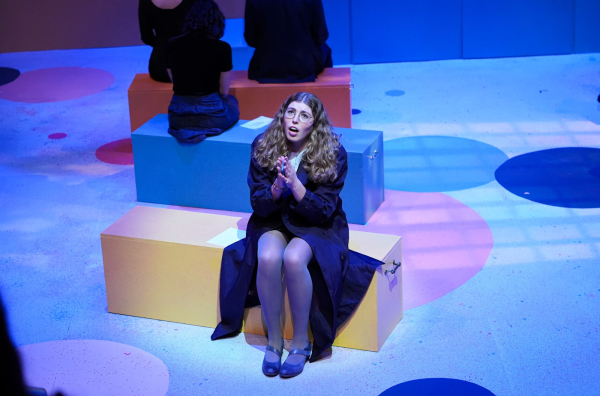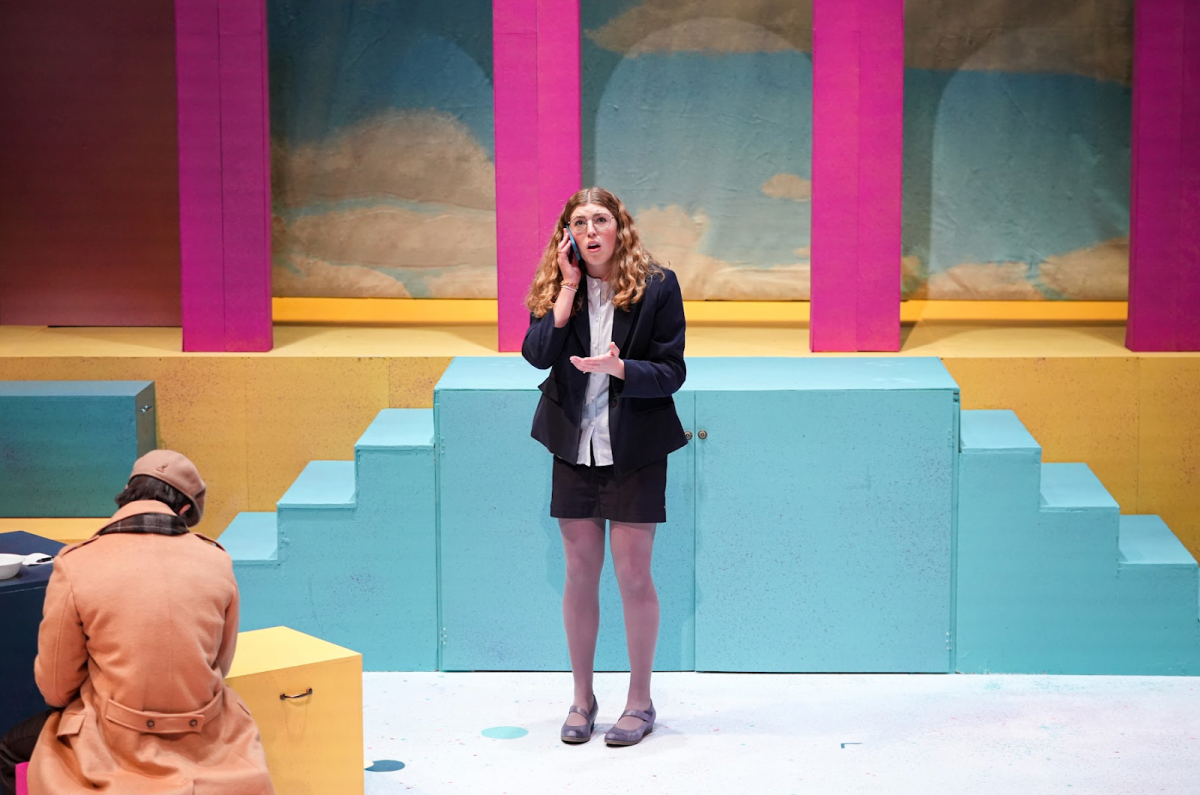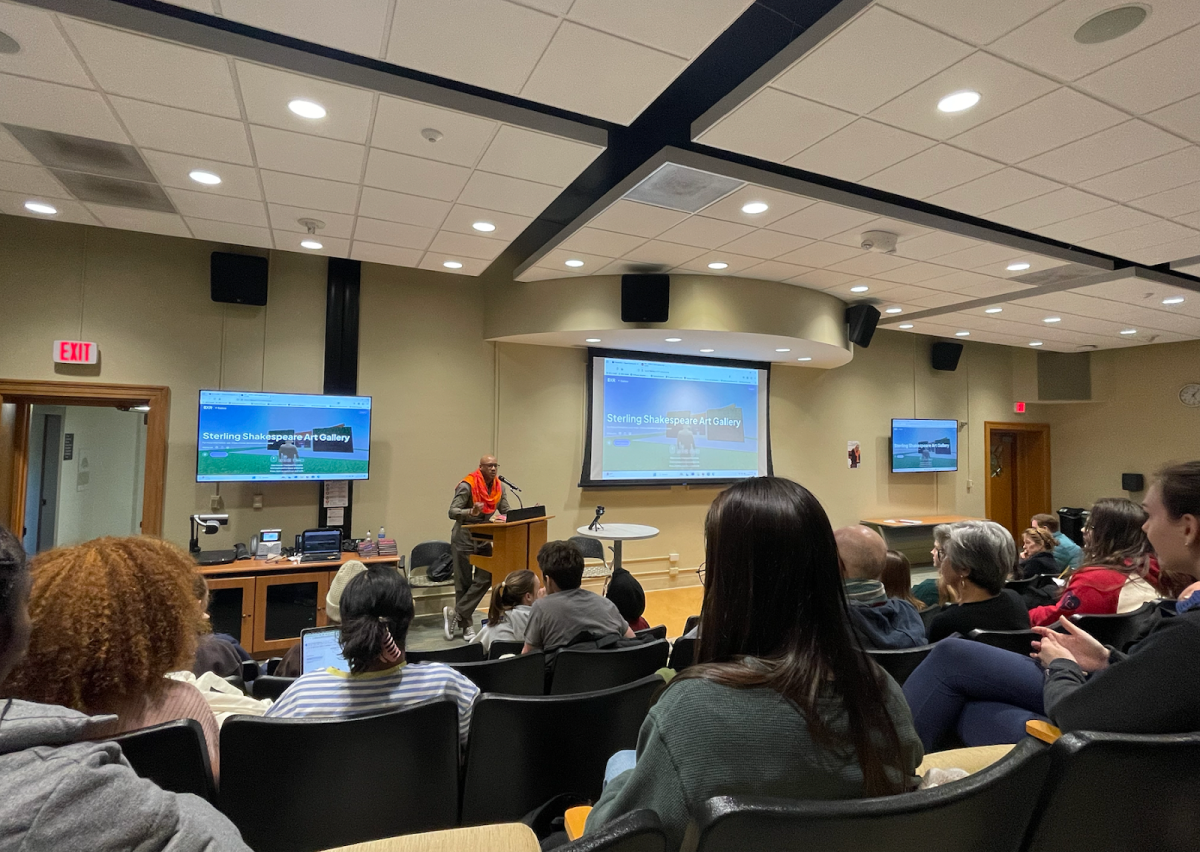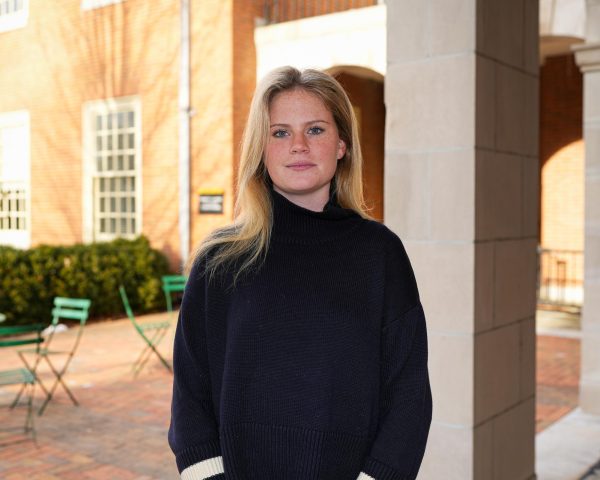Dead Man’s Cell Phone, written by Sarah Ruhl, was brought to the Ring Theater in Scale Fine Arts Center, on Friday, Feb. 12. The play premiered in 2007, just before the technological heist of social interaction by the internet. It serves as a prescient warning of the shift in interpersonal connection, and disconnect, in a world ruled by technology.
The show, which has been in the works since December, opened to numerous overlapping phone call conversations, where seated center stage are the two principal characters: Gene and Gordon.
The central story develops when Gene, played by Ellie Howell, discovers that Gordon, played by Joe Bruno, is — spoiler alert — dead.
As his phone continues to ring in the silent café, she takes the prerogative to answer his calls. At this moment, Gene recognizes Gordon’s phone as his last lifeline to the living world. In taking his calls, she bridges the gap between his story and her own.
Seeing it as her job to keep his legacy alive, Gene keeps the phone, continuing to take calls that will entangle her in a series of nuanced situations. In doing so, she realizes just how little she knows about the stranger who it belonged to.
A second narrative unfolds as Gene becomes entranced with Gordon’s neglected younger brother Dwight, played by Patrick Fenlon.
Fenlon, a Computer Science major, began acting his freshman year at Wake Forest and has since premiered in 10 main stage performances. He describes his discovery of a love of theater as something “[he] just kept getting drawn to – having somewhere to express [himself].”
“This is some of the work that I’m most proud of,” Fenlon said. “I feel that I was able to give the role my own touch. I had a lot of fun with it – bringing Dwight to life.”
Gene and Dwight’s relationship in real life brought their chemistry to the production. Fenlon said, “I had a really fun time on this play, and I got to work with my best friend [Howell].”
Howell has never been in a Wake performance without Fenlon.
“He digs into his characters in a way that I have not experienced, before Wake or in general. I know that in the scene I have a strong actor to rely on, and when we’re out of the scene it’s just [us] again. It’s very special to work with someone I’m so close with because theater is all about community and collaboration,” Howell said.
The central theme of the show is the ever-evolving dependence on electronics in our society.
At one point, Gene is faced with the choice between a deepening connection with Dwight and answering his brothers’ phone, depicting the fundamental dependency we have on technology. Embedded even deeper in the narrative is the obstacle our phones pose in our pursuits to form genuine connections.
Director Brooke Davis states the central question of the production in the program: “Can our phones bring us together while also bringing us apart? How well do we know someone when we only know them virtually? Do we cease to exist when our phone stops ringing?
To further this theme, the ensemble – or sonders, as they chose to call themselves – worked to carefully develop their characters and contribute their monologues to the opening scene. The name sonders was selected to epitomize the sensation of numerous lives –– completely separate from one’s own — unfolding at once. The term ensemble, as Assistant Director Hannah Reynolds explained, “didn’t encapsulate all that they did for the production.”
Reynolds, a presidential scholar for theater, noted the differences between her previous role as an actor and her debut as assistant director.
“Directing is completely different from acting,” Reynolds said. “It’s a step back — a chance to watch everything happening, and help put it together.”

Her position was heavily centered around directing the sonders, whose story development she speaks to with much pride, and said she “loves the collaboration we did to create these enriched characters who filled out the world of the show.”
The monologues, spoken in English, Mandarin and Italian, all revolve around different presentations of love. Each of the sonders worked to form complex inner narratives, ranging from the owner of the café, an intern at a large corporation, a dad away from home and a woman working through a breakup.
Mati Romagnoli, a native Italian student, explained that her character’s story hit close to home.
“In the show, I am a student studying abroad, which is basically what I am.” The theme of her phone call was in relation to nostalgia and homesickness,” She explained, “When I’m away, it feels difficult that everyone else’s life keeps going, even when I’m not there.”
“It was a challenge.” Janiyah Lewis, the heartbroken sonder, speaks to the obstacles she faced in developing her character: “At first, I didn’t know where I fit into the larger arc of the play. My monologue was completely out of character for me. But with the help from the other performers, I think that I was able to really bring her to life.”
Beyond the incredible evolution of the play’s ensemble, the cast did an excellent job of transforming a heavy narrative into a cleverly amusing performance. While darkly humorous, the play is a masterful presentation of such a prevalent universal issue. In each scene, you can look beyond the witty dialogue and uncover a compelling commentary on how every aspect of our society is shaped to accommodate technology.
The central love story between Gene and Dwight helps to restore the viewer’s belief in fate, but in the end, the audience is left to consider the role technology plays in shaping their own destinies.
With their graduation approaching, Fenlon and Howell left it all on the stage as they departed from the Wake Forest community to pursue careers in acting. Ellie reflects on her last appearance on this stage;
“I find that every show I’m in, I take a little bit of the character with me in the end,” Howell said. “Being able to connect with her and thinking, ‘I’m just going to live my life,’ was a special ideology to walk away with. I’m glad that Gene was my last role on campus. It’s nice to know that I’m going out with a bang.”
Correction March 5, 2025: A previous version of this article incorrectly stated that Sarah Ruhl “directed” Dead Man’s Cell Phone. Ruhl wrote the play while Brooke Davis was the play’s director.











